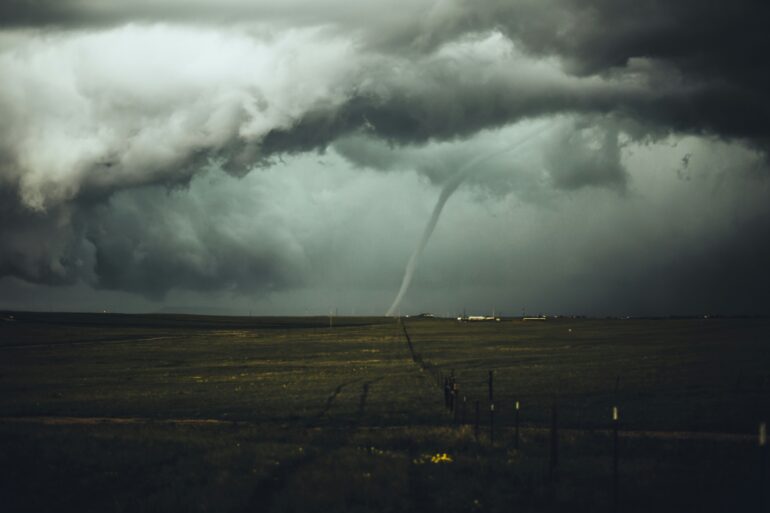Nancy McCabe
1. In Case of Sudden Family Death
Say you haven’t heard from your big brother in a while, and then he misses work, and, six states away, you know he’ll be annoyed by your concern. Call anyway, text him, call the police. They will find him on his living room floor. They will take his body. There are no actual directions for what to do next. Send your little brother to secure the house.
2. In Case of Fire
If stairwells are filled with smoke, use an alternate staircase.
3. In Case of Trauma
If your little brother says it’s like a crime scene, picture the chalk outline of a body, yellow police tape, not blood and brain tissue and fingerprints as if hands flailed to reach the phone six feet away, lighting up with your messages. Arrive after a cousin has cleaned, leaving blackened floorboards, the place where he lay for how long? Days, weeks? Sort through clocks, flashlights, unopened mail at a card table in the dark living room. Stare at that floor hour after hour. Your little brother will pass through, face taut, haunted by the evidence of how your older brother fell, hit his head on the tiles, lay there, dying.
4. In Case of Hazardous Materials
Move to a safe location upwind.
5. In Case of a Drug Overdose
You’ll be notified hours later: your little brother’s heart stopped, he’s in a coma, on a vent, his memory of your other brother’s death practically erased, your little brother drifting away, he’s not coming back, they say. You’ll drive, sun glinting off oncoming cars like bits of glitter, a sign that says, “Caution: Festival ahead!” and everywhere the festive colored lights of police chasing down speeders. Light scatters away from the sequins of passing cars and you’ll wonder why your little brother threw away his life and how your own fleeting fragments of joy can still shimmer.
6. In Case of a Power Outage
Move cautiously to a lighted area.
7. In Case of Brain Damage
Spend hours on the phone, make guardianship arrangements, and drive, keep driving, as your own joy at being alive insists on frothing up, maybe inappropriately, like bubbles from a carbonated beverage, even as your car GPS jams and won’t stop telling you that in thirteen miles you’ll be in Cincinnati. Can someone with brain damage still feel joy? Mapquest won’t update, Google says you’ll arrive in seven days, and your head spins, as if your brain has shut down, doesn’t realize you’re on a walking setting. You try to fathom brain damage. You’ll remember a GPS that said, “Drive 542 miles and then do a legal U-Turn.”
8. In Case of a Tornado
Do not pull a fire alarm, sending people outside and into danger.
9. In Case of Abrupt Discharge from the Hospital
Even if they said he’ll never make decisions again, he’s almost deaf, he can barely walk, he talks in circles, when they discover he has no insurance, he’ll be discharged, he’ll call his son from McDonalds across from the hospital, wanting a ride. Far away, you’ll walk past burned houses strung with yellow police tape, sides still standing, blackened walls visible through windows, neighboring houses now raucous piles of boards, next to them, neat lawns. Black chunked mulch. Circles of bright flowers.
10. In Case of an Earthquake
Get under a table until the shaking stops.
11. In Case of Homelessness
Even if every day feels like 542 miles and then another U-turn, send money, find housing, resources, plow through worry that the emergencies may never end. Your brother has improved, but may never work again. There are no directions for what to do now. Ride your bike through light shattering like glass through trees, weave through slivers and particles past fern leaves, serrated like knives. Blur by tiny white blossoms knit into Queen Anne’s lace. At a picnic table, a black-and-white caterpillar crosses your black-and-white page, little sock writing itself into your poem one section at a time. When you pluck it off it rises like a charmed snake, black lacquered beaded head testing the air, quieter than the breeze sighing through leaves tinkling like broken glass. It inches back through this piecemeal world, broken apart, jigsawing together, fuzzily crossing the page like something that wants to be poetry.
12. In Case of Flood
Water, worry, joy: do not try to cross an overflowing stream.
Nancy McCabe is the author of nine books, most recently the comic novel The Pamela Papers: A Mostly E-pistolary Story About Academic Pandemic Pandemonium (Outpost 19 2024) and the YA novel Vaulting through Time (CamCat 2023), with a middle-grade novel, Fires Burning Underground due out from Fitzroy/Regal House in 2025. Her creative nonfiction has appeared in Prairie Schooner, Fourth Genre, Salon, Newsweek, Gulf Coast, and many others, received a Pushcart, and made notable lists ten times in Best American anthologies.
Photo by Nikolas Noonan on Unsplash


